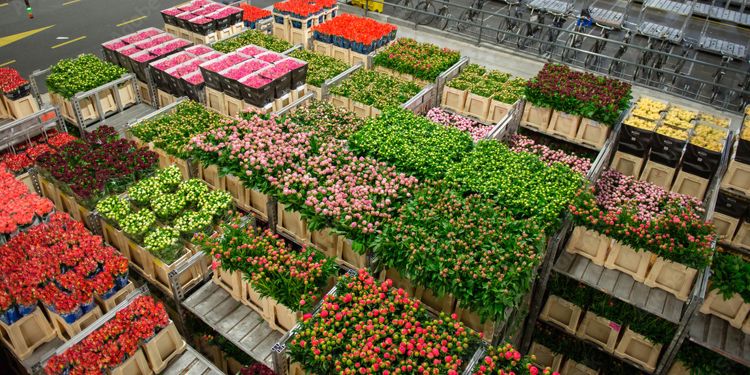In January 2024, Professors Willy Shih and Mike Toffel led 45 HBS MBA students on site visits to witness the energy transition and innovative sustainable production activities throughout Denmark and the Netherlands, in the second year of their Immersive Field Course (IFC). This is one of nine student essays that highlight their reflections.
The Heart of the Global Flower Industry
The Netherlands, often known as the "Flower Capital of the World", is home to Royal FloraHolland (RFH), a remarkable institution that plays a crucial role in the global flower industry. Our visit to this auction house offered a unique lens into the vibrant global horticulture industry.
RFH’s Dominant Global Position: Dominant Position in the Flower Supply Chain
RFH's dominant position in the flower supply chain is intriguing. As a marketplace, it connects growers with buyers, boasting a market share of 90% in the Netherlands and about 60% globally, which makes it the largest flower auction in the world. The diversity of its offerings, with imports from countries like Ethiopia, Kenya, Israel, Ecuador, and Colombia, mirrors the international scope of the flower market.
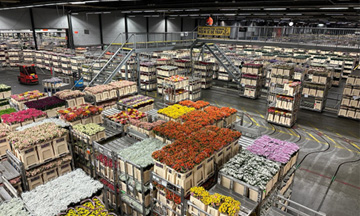
The Buying Process: From Growers to Buyers
In the warehouse, every flower cart is assigned to a designated buyer. Warehouse employees, equipped with headsets, play a crucial role in the seamless transfer of flowers and plants from growers to buyers. They receive precise, automated instructions via their headsets, detailing the specific types and quantities of flowers and plants each buyer requires. Remarkably, RFH has streamlined this process to such an extent that they can deliver flowers purchased by buyers within an hour after the sale is finalized.
The Operational Might of RFH
Royal FloraHolland's operational scale is truly breathtaking. Managing a network of 2,300 buyers, 3,400 members, and 4,800 suppliers, it facilitates an astonishing 101,000 daily transactions. This results in a turnover of 5.2 billion euros. Currently overseeing 4.9 million square meters of real estate, RFH is ambitiously planning the construction of two additional facilities, further expanding its footprint in the global flower market.
With the area of its warehouses comparable to that of the entire state of Monaco, RFH has demonstrated its logistical prowess with a 15 km-long overhead runway system, an innovative solution that efficiently transports flower carts across its vast warehouse complex, effectively saving the equivalent of about 200 truck trips each day. This contrasts with the more manual process of moving flowers from growers to buyers, a deliberate choice made by balancing cost and practicality. The auction, along with the transfer of flowers, occurs for just a few hours each morning. This limited operational window makes it cost-prohibitive to invest in robotic solutions that are best utilized operating 24/7.
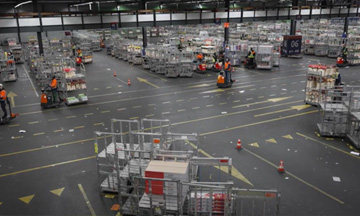
Sustainability and Environmental Responsibility: A Core Focus
With the global conversation around climate change intensifying, RFH's commitment to sustainability becomes increasingly vital as carbon emissions associated with the production and distribution of flowers are increasingly being scrutinized by consumers. Therefore, RFH is actively advocating for certifications that highlight the sustainability of its growers' practices, a key initiative in informing buyers. However, this is a challenge as RFH is a cooperative owned by the growers themselves. Currently, 70% of their products are certified, but this is largely attributable to the 25% of the larger growers who have the resources to invest in such certifications. Conversely, smaller growers often overlook the significance of these certifications and typically lack the necessary operational capacity to pursue them, underscoring a divide in the adoption of sustainable practices within the RFH community. RFH also champions eco-friendly cultivation methods, such as using natural pest control and innovative frostbite protection techniques, prioritizing pesticide-free flowers, and overall environmental responsibility.
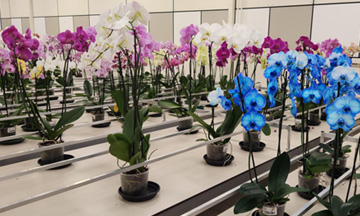
Ensuring Excellence in Every Petal: Quality Assurance at RFH
While the growers are responsible for the quality of the flowers they sell, RFH employees will also engage in quality checks and research. In fact, quality assurance is a hallmark of RFH's operations. The auction house's dedicated Product Quality Knowledge Centers in Aalsmeer, Naaldwijk, and Rijnburg conduct extensive research and trials aimed to enhance flower quality and shelf life, and in turn, reduce waste. Findings from this research are shared with growers.
A crucial aspect of flower cultivation is crop protection. RFH has embraced environmentally friendly methods to address this. They utilize natural approaches, like employing orange oil and predator insects to fend off pests, ensuring their flowers are pesticide-free—a quality highly prized by retailers. To combat frostbite, RFH adopts innovative techniques such as specialized coatings, moving away from conventional methods like water spraying or air mixing. These practices highlight RFH's commitment to sustainability and demonstrate its proactive role in enhancing cultivation methods for a greener future.
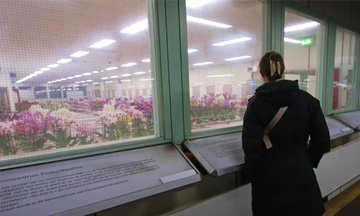
Final Thoughts
Our visit to Royal FloraHolland was more than just an educational excursion, it was an enlightening journey into the core of the global flower trade. Witnessing RFH's unique blend of operational efficiency, commitment to sustainability, and dedication to quality, we gained invaluable insights into the complex and beautiful world of flowers. As a central figure in the flower supply chain, RFH's role is indispensable in connecting growers with buyers and steering the industry toward a blooming and sustainable future.

